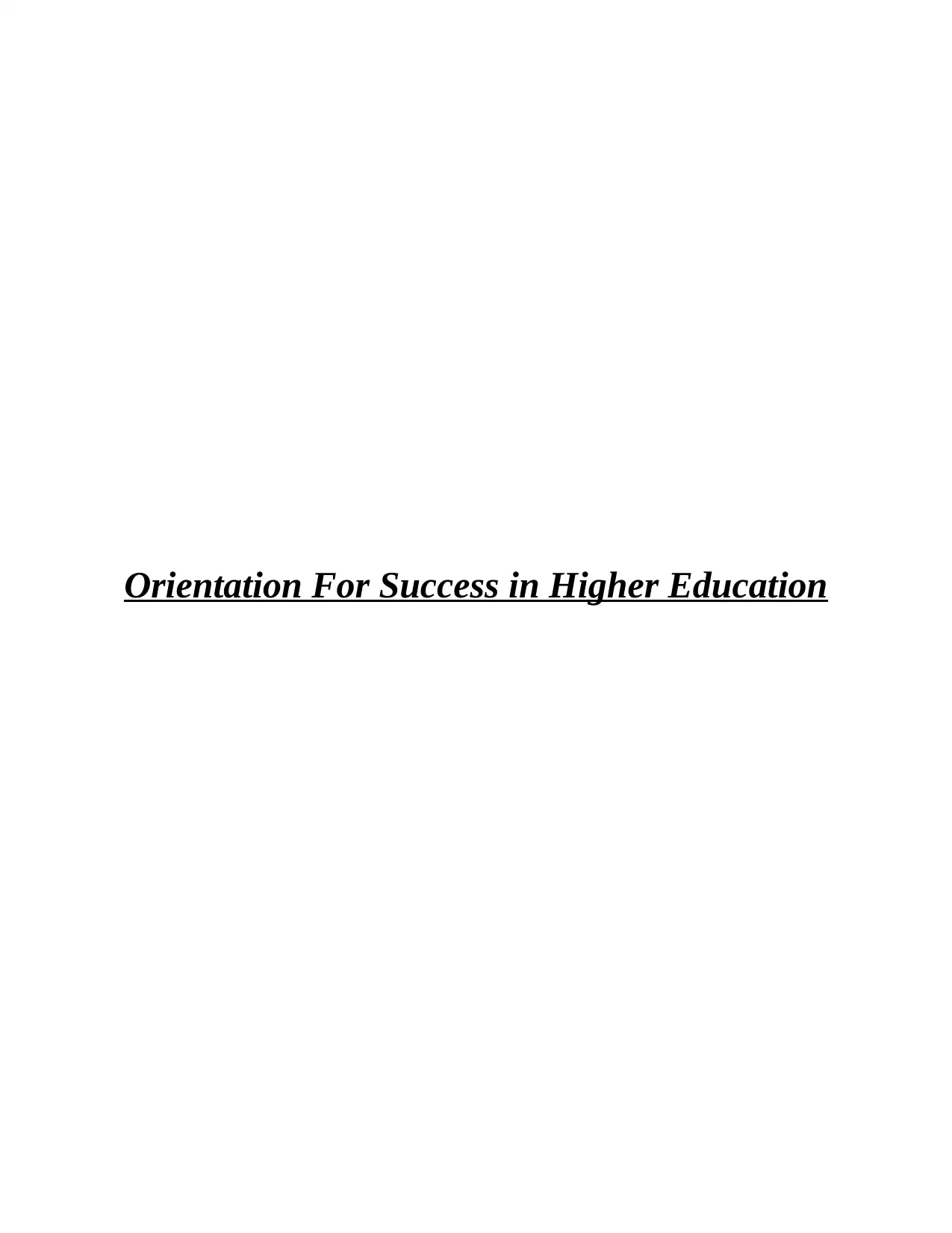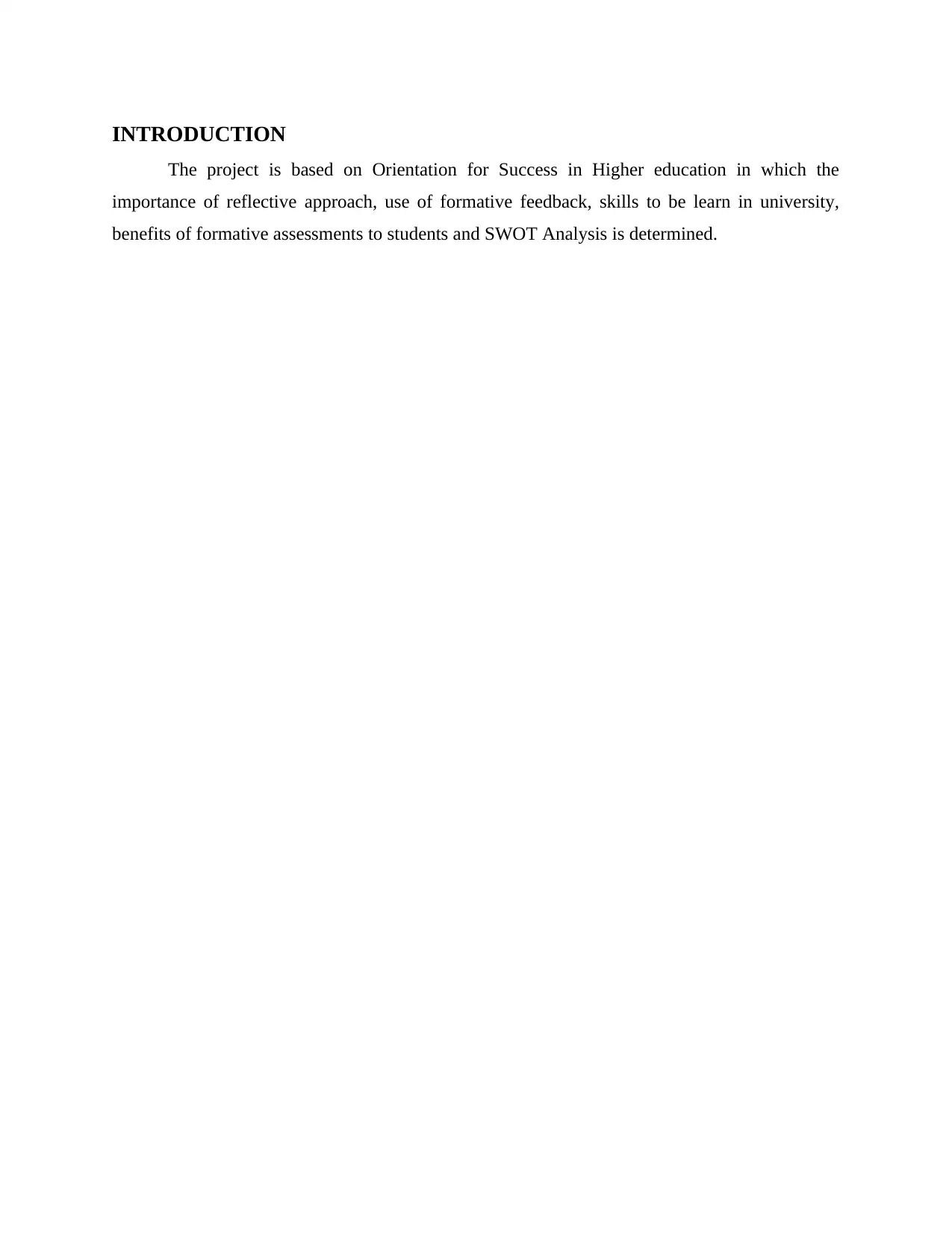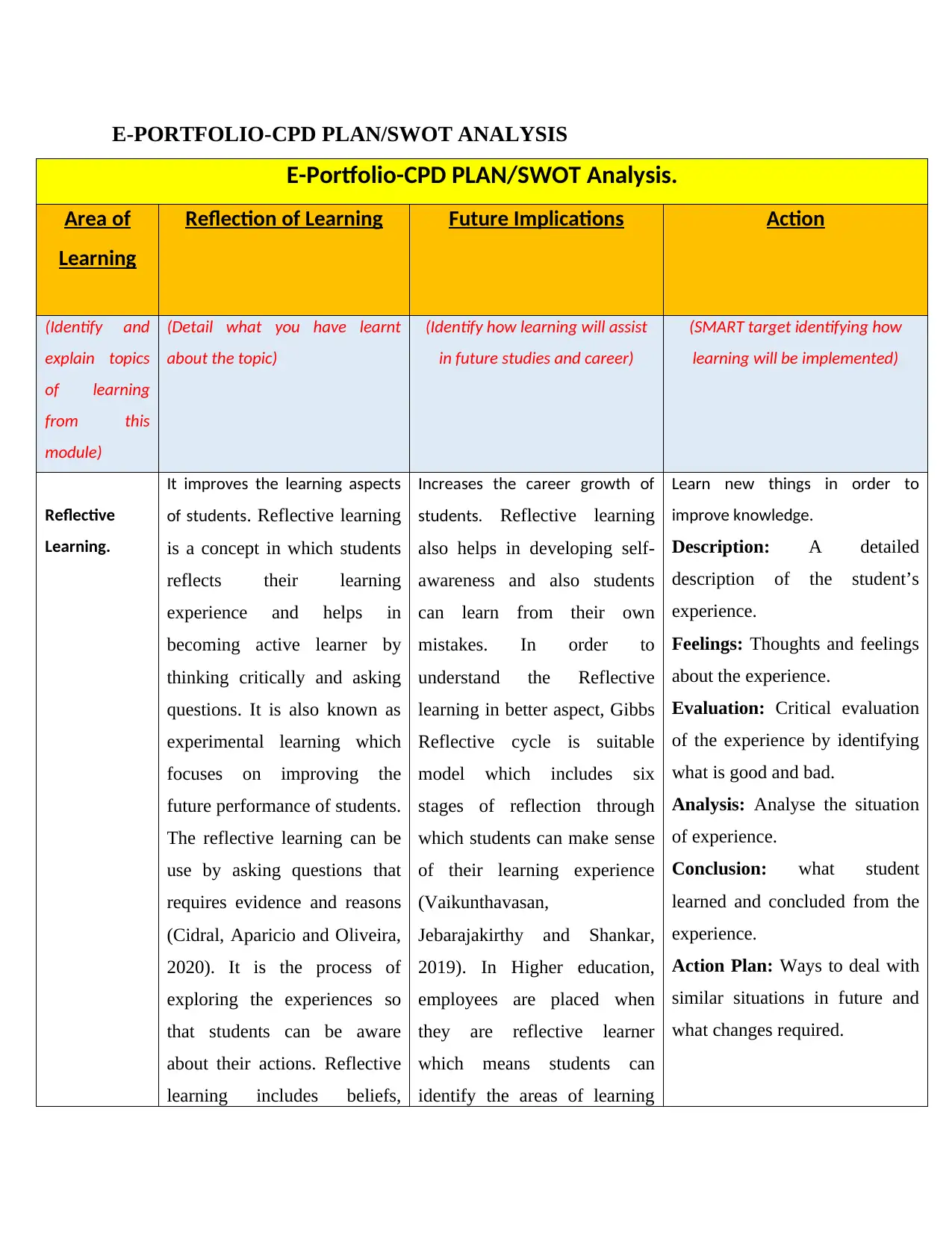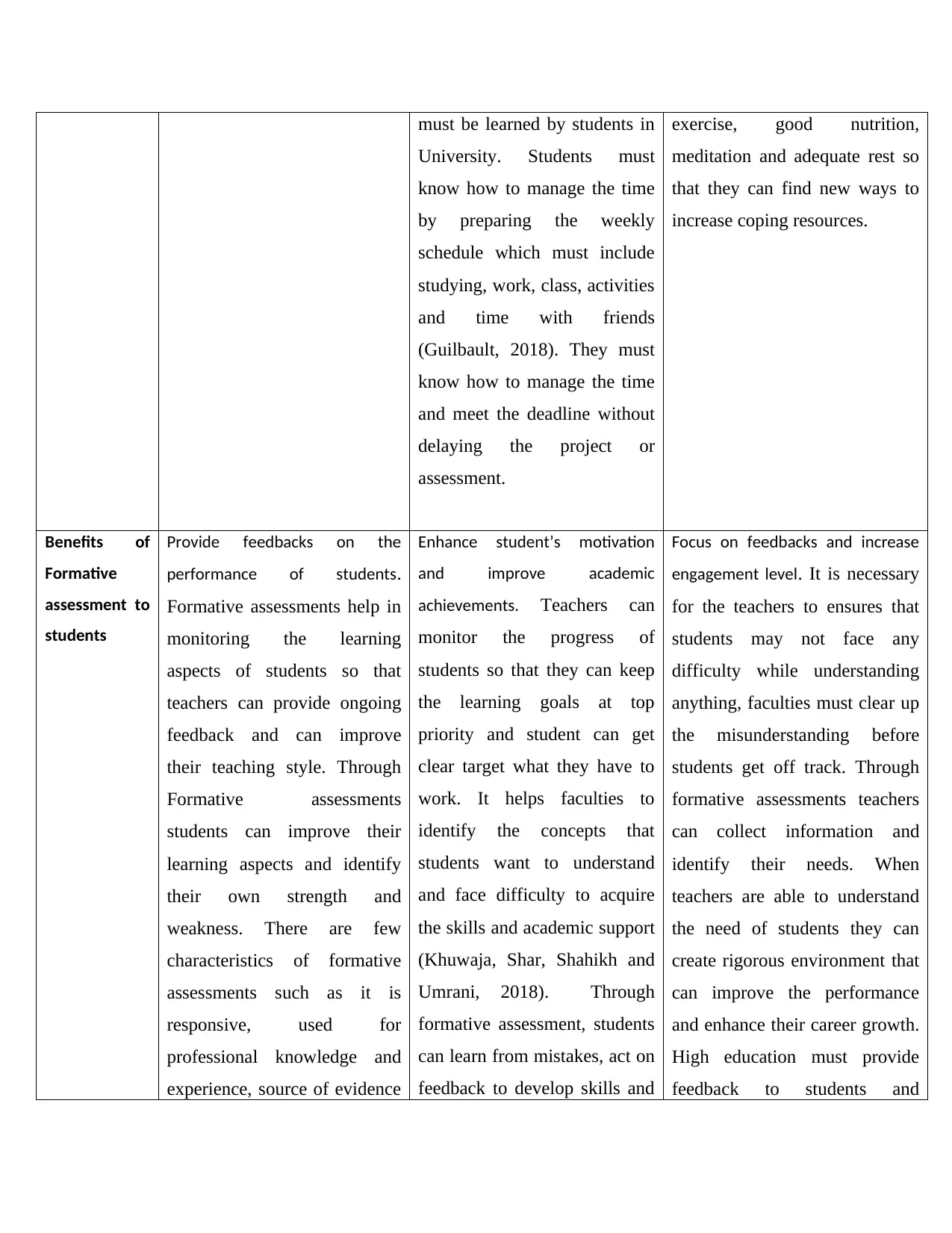Orientation for Success in Higher Education: A Detailed SWOT Analysis
VerifiedAdded on 2023/06/18
|10
|2131
|459
Report
AI Summary
This report focuses on orientation for success in higher education, emphasizing reflective learning, formative feedback, essential university skills, and the benefits of formative assessments. It includes a detailed E-Portfolio-CPD plan incorporating a SWOT analysis to identify strengths, weaknesses, opportunities, and threats. The report explores reflective learning's impact on career growth and self-awareness, the importance of formative feedback in improving student performance and motivation, and the critical skills students must acquire for success in a competitive environment, such as communication, time management, and stress management. The analysis concludes that understanding one's strengths and weaknesses is vital for achieving career objectives and goals effectively. This resource is ideal for students seeking to enhance their understanding of key success factors in higher education. Desklib provides this and many other resources for students looking for solved assignments.

Orientation For Success in Higher Education
Paraphrase This Document
Need a fresh take? Get an instant paraphrase of this document with our AI Paraphraser

Table of Contents
INTRODUCTION...........................................................................................................................3
E-PORTFOLIO-CPD PLAN/SWOT ANALYSIS..........................................................................4
CONCLUSION................................................................................................................................9
REFERENCES..............................................................................................................................10
INTRODUCTION...........................................................................................................................3
E-PORTFOLIO-CPD PLAN/SWOT ANALYSIS..........................................................................4
CONCLUSION................................................................................................................................9
REFERENCES..............................................................................................................................10

INTRODUCTION
The project is based on Orientation for Success in Higher education in which the
importance of reflective approach, use of formative feedback, skills to be learn in university,
benefits of formative assessments to students and SWOT Analysis is determined.
The project is based on Orientation for Success in Higher education in which the
importance of reflective approach, use of formative feedback, skills to be learn in university,
benefits of formative assessments to students and SWOT Analysis is determined.
⊘ This is a preview!⊘
Do you want full access?
Subscribe today to unlock all pages.

Trusted by 1+ million students worldwide

E-PORTFOLIO-CPD PLAN/SWOT ANALYSIS
E-Portfolio-CPD PLAN/SWOT Analysis.
Area of
Learning
Reflection of Learning Future Implications Action
(Identify and
explain topics
of learning
from this
module)
(Detail what you have learnt
about the topic)
(Identify how learning will assist
in future studies and career)
(SMART target identifying how
learning will be implemented)
Reflective
Learning.
It improves the learning aspects
of students. Reflective learning
is a concept in which students
reflects their learning
experience and helps in
becoming active learner by
thinking critically and asking
questions. It is also known as
experimental learning which
focuses on improving the
future performance of students.
The reflective learning can be
use by asking questions that
requires evidence and reasons
(Cidral, Aparicio and Oliveira,
2020). It is the process of
exploring the experiences so
that students can be aware
about their actions. Reflective
learning includes beliefs,
Increases the career growth of
students. Reflective learning
also helps in developing self-
awareness and also students
can learn from their own
mistakes. In order to
understand the Reflective
learning in better aspect, Gibbs
Reflective cycle is suitable
model which includes six
stages of reflection through
which students can make sense
of their learning experience
(Vaikunthavasan,
Jebarajakirthy and Shankar,
2019). In Higher education,
employees are placed when
they are reflective learner
which means students can
identify the areas of learning
Learn new things in order to
improve knowledge.
Description: A detailed
description of the student’s
experience.
Feelings: Thoughts and feelings
about the experience.
Evaluation: Critical evaluation
of the experience by identifying
what is good and bad.
Analysis: Analyse the situation
of experience.
Conclusion: what student
learned and concluded from the
experience.
Action Plan: Ways to deal with
similar situations in future and
what changes required.
E-Portfolio-CPD PLAN/SWOT Analysis.
Area of
Learning
Reflection of Learning Future Implications Action
(Identify and
explain topics
of learning
from this
module)
(Detail what you have learnt
about the topic)
(Identify how learning will assist
in future studies and career)
(SMART target identifying how
learning will be implemented)
Reflective
Learning.
It improves the learning aspects
of students. Reflective learning
is a concept in which students
reflects their learning
experience and helps in
becoming active learner by
thinking critically and asking
questions. It is also known as
experimental learning which
focuses on improving the
future performance of students.
The reflective learning can be
use by asking questions that
requires evidence and reasons
(Cidral, Aparicio and Oliveira,
2020). It is the process of
exploring the experiences so
that students can be aware
about their actions. Reflective
learning includes beliefs,
Increases the career growth of
students. Reflective learning
also helps in developing self-
awareness and also students
can learn from their own
mistakes. In order to
understand the Reflective
learning in better aspect, Gibbs
Reflective cycle is suitable
model which includes six
stages of reflection through
which students can make sense
of their learning experience
(Vaikunthavasan,
Jebarajakirthy and Shankar,
2019). In Higher education,
employees are placed when
they are reflective learner
which means students can
identify the areas of learning
Learn new things in order to
improve knowledge.
Description: A detailed
description of the student’s
experience.
Feelings: Thoughts and feelings
about the experience.
Evaluation: Critical evaluation
of the experience by identifying
what is good and bad.
Analysis: Analyse the situation
of experience.
Conclusion: what student
learned and concluded from the
experience.
Action Plan: Ways to deal with
similar situations in future and
what changes required.
Paraphrase This Document
Need a fresh take? Get an instant paraphrase of this document with our AI Paraphraser

attitudes, personal experiences,
fears and assumptions. The
learning can be used in
complement new knowledge
and new experiences. There
are various benefits of
reflective learning as it helps
in recording the development
and also students can identify
their strength and weakness.
that requires further
development, they can make
themselves more independent
learners and also students can
critically evaluate their
learning. The Gibbs reflective
cycle includes six stages they
are Description, feelings,
evaluation, analysis,
conclusion and action plan.
Use of
Formative
feedback
Focuses on increasing the skills
and knowledge. Formative
Feedback is process of
monitoring the students
learning by providing them
feedback which helps in
improving their learning
ability and capability.
Formative feedback is a
concept of engaging students
to reflect on how they can
orient, evaluate and approach
the learning aspect. The main
use of formative feedback is
that it helps in improving the
performance and efficiency of
students due to which they
focus on learning new things
in Higher Education. The
faculties determines the
Improves the performance and
efficiency of students while
learning. Teachers can use
formative feedback to
determine the performance and
efficiency level of students in
Classroom. It is necessary for
the teachers to identify the
level of performance students
are contributing in lectures so
that they can work on
developing the skills and
knowledge of learners. The
Formative feedback helps
students to become self-
regulated learners and also give
them confidence going into
final. It is important in
University as feedbacks
provide opportunity to improve
By implementing the feedbacks, it
focuses on improving the
performance. Formative
feedback also changes the
thinking of learners in order to
enhance the motivation level and
learning aspects. Through
formative feedback, students can
also identify their strength and
weakness, they can also refine
their understanding due to which
they can support towards
engaging and self-regulated
learning (Nguyen, Muilu, Dirin
and Alamäki, 2018). It helps in
increasing the confidence and
motivation level of students,
define learning goals and
improve academic
achievements.
fears and assumptions. The
learning can be used in
complement new knowledge
and new experiences. There
are various benefits of
reflective learning as it helps
in recording the development
and also students can identify
their strength and weakness.
that requires further
development, they can make
themselves more independent
learners and also students can
critically evaluate their
learning. The Gibbs reflective
cycle includes six stages they
are Description, feelings,
evaluation, analysis,
conclusion and action plan.
Use of
Formative
feedback
Focuses on increasing the skills
and knowledge. Formative
Feedback is process of
monitoring the students
learning by providing them
feedback which helps in
improving their learning
ability and capability.
Formative feedback is a
concept of engaging students
to reflect on how they can
orient, evaluate and approach
the learning aspect. The main
use of formative feedback is
that it helps in improving the
performance and efficiency of
students due to which they
focus on learning new things
in Higher Education. The
faculties determines the
Improves the performance and
efficiency of students while
learning. Teachers can use
formative feedback to
determine the performance and
efficiency level of students in
Classroom. It is necessary for
the teachers to identify the
level of performance students
are contributing in lectures so
that they can work on
developing the skills and
knowledge of learners. The
Formative feedback helps
students to become self-
regulated learners and also give
them confidence going into
final. It is important in
University as feedbacks
provide opportunity to improve
By implementing the feedbacks, it
focuses on improving the
performance. Formative
feedback also changes the
thinking of learners in order to
enhance the motivation level and
learning aspects. Through
formative feedback, students can
also identify their strength and
weakness, they can also refine
their understanding due to which
they can support towards
engaging and self-regulated
learning (Nguyen, Muilu, Dirin
and Alamäki, 2018). It helps in
increasing the confidence and
motivation level of students,
define learning goals and
improve academic
achievements.

learning capabilities of
students due to which they can
focus on class in more
significant and effective
manner in order to meet their
learning needs (Roberts,
2018).
and increase the final marks of
students.
Explain Skills
to successfully
learn in the
University.
Student must learn the skills in
order to survive in competitive
environment. Students must
have a set of skills and
knowledge which makes them
unique and different from
other people. There are various
skills which must be earned by
students in higher Education
such as time management
skills, communication skills,
stress management, critical
thinking and problem solving
skills. These skills are
communication skills, time
management skills, critically
thinking and problem solving
and stress management.
Students with skills and
knowledge are in high demand in
corporate world.
Communication skills is one
of the skill which must be
learned by Students in Higher
Education. Students must know
the importance of
communication skills in higher
education and corporate world.
The Communication skills
helps in influencing and
sharing the viewpoint in clear
manner. It is necessary for the
students to improve their
communication skills in order
to sustain in competitive
environment. Through
Communication skills, students
can provide understanding of
intentions and emotion behind
the information.
Time Management
Skills is another skill which
Skills helps in enhancing the
individual and professional growth.
Critically thinking and
problem solving is also a skill
that must be learned by students
in Higher Education. While
learning students may face
various problems and issues
which they must handle by
thinking out of box and
approach the issue from new
angles. Student must know how
to solve the problem in effective
and efficient manner so that they
can learn the things without
facing any issues.
Stress Management is
one of the skills which students
must learn in order to learn
things without taking stress.
Students must know how to
reduce the stress and perform
well in Classroom. The Stress
can be reduced by regular
students due to which they can
focus on class in more
significant and effective
manner in order to meet their
learning needs (Roberts,
2018).
and increase the final marks of
students.
Explain Skills
to successfully
learn in the
University.
Student must learn the skills in
order to survive in competitive
environment. Students must
have a set of skills and
knowledge which makes them
unique and different from
other people. There are various
skills which must be earned by
students in higher Education
such as time management
skills, communication skills,
stress management, critical
thinking and problem solving
skills. These skills are
communication skills, time
management skills, critically
thinking and problem solving
and stress management.
Students with skills and
knowledge are in high demand in
corporate world.
Communication skills is one
of the skill which must be
learned by Students in Higher
Education. Students must know
the importance of
communication skills in higher
education and corporate world.
The Communication skills
helps in influencing and
sharing the viewpoint in clear
manner. It is necessary for the
students to improve their
communication skills in order
to sustain in competitive
environment. Through
Communication skills, students
can provide understanding of
intentions and emotion behind
the information.
Time Management
Skills is another skill which
Skills helps in enhancing the
individual and professional growth.
Critically thinking and
problem solving is also a skill
that must be learned by students
in Higher Education. While
learning students may face
various problems and issues
which they must handle by
thinking out of box and
approach the issue from new
angles. Student must know how
to solve the problem in effective
and efficient manner so that they
can learn the things without
facing any issues.
Stress Management is
one of the skills which students
must learn in order to learn
things without taking stress.
Students must know how to
reduce the stress and perform
well in Classroom. The Stress
can be reduced by regular
⊘ This is a preview!⊘
Do you want full access?
Subscribe today to unlock all pages.

Trusted by 1+ million students worldwide

must be learned by students in
University. Students must
know how to manage the time
by preparing the weekly
schedule which must include
studying, work, class, activities
and time with friends
(Guilbault, 2018). They must
know how to manage the time
and meet the deadline without
delaying the project or
assessment.
exercise, good nutrition,
meditation and adequate rest so
that they can find new ways to
increase coping resources.
Benefits of
Formative
assessment to
students
Provide feedbacks on the
performance of students.
Formative assessments help in
monitoring the learning
aspects of students so that
teachers can provide ongoing
feedback and can improve
their teaching style. Through
Formative assessments
students can improve their
learning aspects and identify
their own strength and
weakness. There are few
characteristics of formative
assessments such as it is
responsive, used for
professional knowledge and
experience, source of evidence
Enhance student’s motivation
and improve academic
achievements. Teachers can
monitor the progress of
students so that they can keep
the learning goals at top
priority and student can get
clear target what they have to
work. It helps faculties to
identify the concepts that
students want to understand
and face difficulty to acquire
the skills and academic support
(Khuwaja, Shar, Shahikh and
Umrani, 2018). Through
formative assessment, students
can learn from mistakes, act on
feedback to develop skills and
Focus on feedbacks and increase
engagement level. It is necessary
for the teachers to ensures that
students may not face any
difficulty while understanding
anything, faculties must clear up
the misunderstanding before
students get off track. Through
formative assessments teachers
can collect information and
identify their needs. When
teachers are able to understand
the need of students they can
create rigorous environment that
can improve the performance
and enhance their career growth.
High education must provide
feedback to students and
University. Students must
know how to manage the time
by preparing the weekly
schedule which must include
studying, work, class, activities
and time with friends
(Guilbault, 2018). They must
know how to manage the time
and meet the deadline without
delaying the project or
assessment.
exercise, good nutrition,
meditation and adequate rest so
that they can find new ways to
increase coping resources.
Benefits of
Formative
assessment to
students
Provide feedbacks on the
performance of students.
Formative assessments help in
monitoring the learning
aspects of students so that
teachers can provide ongoing
feedback and can improve
their teaching style. Through
Formative assessments
students can improve their
learning aspects and identify
their own strength and
weakness. There are few
characteristics of formative
assessments such as it is
responsive, used for
professional knowledge and
experience, source of evidence
Enhance student’s motivation
and improve academic
achievements. Teachers can
monitor the progress of
students so that they can keep
the learning goals at top
priority and student can get
clear target what they have to
work. It helps faculties to
identify the concepts that
students want to understand
and face difficulty to acquire
the skills and academic support
(Khuwaja, Shar, Shahikh and
Umrani, 2018). Through
formative assessment, students
can learn from mistakes, act on
feedback to develop skills and
Focus on feedbacks and increase
engagement level. It is necessary
for the teachers to ensures that
students may not face any
difficulty while understanding
anything, faculties must clear up
the misunderstanding before
students get off track. Through
formative assessments teachers
can collect information and
identify their needs. When
teachers are able to understand
the need of students they can
create rigorous environment that
can improve the performance
and enhance their career growth.
High education must provide
feedback to students and
Paraphrase This Document
Need a fresh take? Get an instant paraphrase of this document with our AI Paraphraser

and students disclosure.
Formative assessments help in
providing evidence related to
the students performance so
that teachers can make
adjustments according to it and
improve their efficiency and
learning abilities.
knowledge and clarify their
understanding. There are
various benefits of formative
assessments such as it defines
the learning goals, increase
rigor, improves academic
achievements, enhance
students motivation, increase
students engagements,
personalised learning
experience and focuses on
feedback (Mishra, 2020).
faculties so that they focus on
achieving their goals due to
which the academic achievement
can be increased.
SWOT Analysis
SWOT Analysis stands for strength, weakness, threat and opportunity, it helps in analysing the internal
capabilities of the students (Chan, 2019). Through SWOT Analysis students can identify their strength and weakness
and also they can grab the opportunity which helps in increasing their career growth.
Strength
My Communication skills is effective due to
which I can influence other people and explain
my viewpoints in clear manner.
I have an ability to adapt the new things
quickly.
Weakness
I have a fear of failure due to which I face
problem in achieving career goals and
objectives.
My weakness is that I am unable to manage
the time due to which I get delayed to deliver
the project on adequate time.
Opportunities
The opportunity which I can grab is focusing
on another education venue.
I must also focus on reducing my fear of
failure so that I can compete with other
people.
Threat
In this competitive environment there is high
competition due to which I can face difficulty
to place in top organisations.
I can also face threat related to my career
planning as it reduces my personal time.
Formative assessments help in
providing evidence related to
the students performance so
that teachers can make
adjustments according to it and
improve their efficiency and
learning abilities.
knowledge and clarify their
understanding. There are
various benefits of formative
assessments such as it defines
the learning goals, increase
rigor, improves academic
achievements, enhance
students motivation, increase
students engagements,
personalised learning
experience and focuses on
feedback (Mishra, 2020).
faculties so that they focus on
achieving their goals due to
which the academic achievement
can be increased.
SWOT Analysis
SWOT Analysis stands for strength, weakness, threat and opportunity, it helps in analysing the internal
capabilities of the students (Chan, 2019). Through SWOT Analysis students can identify their strength and weakness
and also they can grab the opportunity which helps in increasing their career growth.
Strength
My Communication skills is effective due to
which I can influence other people and explain
my viewpoints in clear manner.
I have an ability to adapt the new things
quickly.
Weakness
I have a fear of failure due to which I face
problem in achieving career goals and
objectives.
My weakness is that I am unable to manage
the time due to which I get delayed to deliver
the project on adequate time.
Opportunities
The opportunity which I can grab is focusing
on another education venue.
I must also focus on reducing my fear of
failure so that I can compete with other
people.
Threat
In this competitive environment there is high
competition due to which I can face difficulty
to place in top organisations.
I can also face threat related to my career
planning as it reduces my personal time.

CONCLUSION
It is being concluded from the above information that students must identify their
strength and weakness so that they can improve their career objectives and goals and achieve it
in appropriate manner.
It is being concluded from the above information that students must identify their
strength and weakness so that they can improve their career objectives and goals and achieve it
in appropriate manner.
⊘ This is a preview!⊘
Do you want full access?
Subscribe today to unlock all pages.

Trusted by 1+ million students worldwide

REFERENCES
Books and Journals
Chan, M., 2019. An Analysis of New Student Orientation Programs at US Four-Year Colleges:
How Can Administrators Enhance the First and Major Milestone of a Student's
Academic Journey?. Planning for Higher Education. 47(3). pp.38-52.
Cidral, W., Aparicio, M. and Oliveira, T., 2020. Students’ long-term orientation role in e-
learning success: A Brazilian study. Heliyon. 6(12). p.e05735.
Guilbault, M., 2018. Students as customers in higher education: The (controversial) debate needs
to end. Journal of retailing and consumer services, 40, pp.295-298.
Khuwaja, F.M., Shar, S., Shahikh, S.S. and Umrani, W.A., 2018. The first and second order
measurements of context specific market orientation in relation to performance of higher
education institutions. International Journal of Advanced and Applied Sciences. 5(12).
pp.72-91.
Mishra, S., 2020. Social networks, social capital, social support and academic success in higher
education: A systematic review with a special focus on
‘underrepresented’students. Educational Research Review, 29, p.100307.
Nguyen, N., Muilu, T., Dirin, A. and Alamäki, A., 2018. An interactive and augmented learning
concept for orientation week in higher education. International Journal of Educational
Technology in Higher Education. 15(1). pp.1-15.
Roberts, J., 2018. Professional staff contributions to student retention and success in higher
education. Journal of Higher Education Policy and Management. 40(2). pp.140-153.
Vaikunthavasan, S., Jebarajakirthy, C. and Shankar, A., 2019. How to make higher education
institutions innovative: An application of market orientation practices. Journal of
Nonprofit & Public Sector Marketing. 31(3). pp.274-302.
Books and Journals
Chan, M., 2019. An Analysis of New Student Orientation Programs at US Four-Year Colleges:
How Can Administrators Enhance the First and Major Milestone of a Student's
Academic Journey?. Planning for Higher Education. 47(3). pp.38-52.
Cidral, W., Aparicio, M. and Oliveira, T., 2020. Students’ long-term orientation role in e-
learning success: A Brazilian study. Heliyon. 6(12). p.e05735.
Guilbault, M., 2018. Students as customers in higher education: The (controversial) debate needs
to end. Journal of retailing and consumer services, 40, pp.295-298.
Khuwaja, F.M., Shar, S., Shahikh, S.S. and Umrani, W.A., 2018. The first and second order
measurements of context specific market orientation in relation to performance of higher
education institutions. International Journal of Advanced and Applied Sciences. 5(12).
pp.72-91.
Mishra, S., 2020. Social networks, social capital, social support and academic success in higher
education: A systematic review with a special focus on
‘underrepresented’students. Educational Research Review, 29, p.100307.
Nguyen, N., Muilu, T., Dirin, A. and Alamäki, A., 2018. An interactive and augmented learning
concept for orientation week in higher education. International Journal of Educational
Technology in Higher Education. 15(1). pp.1-15.
Roberts, J., 2018. Professional staff contributions to student retention and success in higher
education. Journal of Higher Education Policy and Management. 40(2). pp.140-153.
Vaikunthavasan, S., Jebarajakirthy, C. and Shankar, A., 2019. How to make higher education
institutions innovative: An application of market orientation practices. Journal of
Nonprofit & Public Sector Marketing. 31(3). pp.274-302.
1 out of 10
Related Documents
Your All-in-One AI-Powered Toolkit for Academic Success.
+13062052269
info@desklib.com
Available 24*7 on WhatsApp / Email
![[object Object]](/_next/static/media/star-bottom.7253800d.svg)
Unlock your academic potential
Copyright © 2020–2026 A2Z Services. All Rights Reserved. Developed and managed by ZUCOL.





